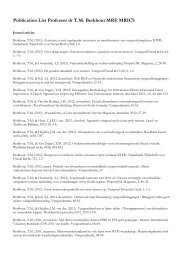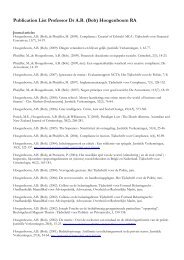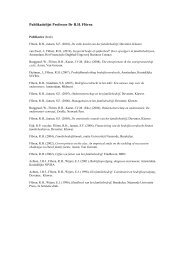Essays on supplier responsiveness and buyer firm value - Nyenrode ...
Essays on supplier responsiveness and buyer firm value - Nyenrode ...
Essays on supplier responsiveness and buyer firm value - Nyenrode ...
You also want an ePaper? Increase the reach of your titles
YUMPU automatically turns print PDFs into web optimized ePapers that Google loves.
“It is <strong>on</strong>e of the comm<strong>on</strong>est of mistakes to c<strong>on</strong>sider that the limit of our power<br />
of percepti<strong>on</strong> is also the limit of all there is to perceive.”<br />
—C. W. Leadbeater (n.d.)<br />
"On the face of it, shareholder <strong>value</strong> is the dumbest idea in the world."<br />
—Jack Welch<br />
Former CEO, General Electric (Guerrera,<br />
2009).<br />
4.1 Introducti<strong>on</strong><br />
The financial crisis of 2009 is an example of the inc<strong>on</strong>gruence between subjective <strong>and</strong><br />
objective measurement. Prior to the financial crisis, many <strong>firm</strong>s had benefitted because of<br />
investors’ irrati<strong>on</strong>al exuberance about financial markets (Akerlof & Shiller, 2010). This<br />
benefit occurred even though many <strong>firm</strong>’s objective financial indicators did not reflect such<br />
exuberance. The outcome of the diss<strong>on</strong>ance between subjective <strong>and</strong> objective measurement<br />
can be grave, as is illustrated by the large number of bankruptcies in 2009. Similarly, in the<br />
market orientati<strong>on</strong> literature, numerous studies have included objective <strong>and</strong> subjective or<br />
perceptual measures <strong>and</strong> have c<strong>on</strong>tradictory or different results (Jaworski & Kohli, 1993;<br />
Narver & Slater, 1990). We define subjective metrics as those based <strong>on</strong> managerial<br />
heuristics <strong>and</strong> objective metrics as those based <strong>on</strong> some externally verifiable accounting or<br />
financial procedure.<br />
All subjective or perceptual data are based <strong>on</strong> human percepti<strong>on</strong>s. Human<br />
percepti<strong>on</strong>s are notoriously fickle <strong>and</strong> not necessarily a representative of market realities<br />
(Cassidy, 2009, pp. 10-11). This is not because people or managers are irrati<strong>on</strong>al, but rather<br />
because their limited mental capabilities do not at times allow them to process all the<br />
complicated factors or indicators (Cassidy, 2009, pp. 10-11). Furthermore, managers 4<br />
usually <strong>on</strong>ly remember more recent events (Foer, 2011). This is a weakness when<br />
measuring <strong>supplier</strong> performance because the relati<strong>on</strong>ship is based <strong>on</strong> a c<strong>on</strong>tinuum of<br />
interacti<strong>on</strong>s, not just the most recent interacti<strong>on</strong>s. Tversky <strong>and</strong> Kahneman (1974)<br />
investigated heuristics or mental short cuts. The first mental short cut is representativeness,<br />
meaning that managers generalize with insufficient evidence (Cassidy, 2009, p. 195;<br />
Tversky & Kahneman, 1974). Even when experimental subjects were provided with<br />
statistical data to guide their decisi<strong>on</strong>s, they still jumped to c<strong>on</strong>clusi<strong>on</strong>s for which they did<br />
not have much evidence (Cassidy, 2009, pp. 195-196). This jumping to c<strong>on</strong>clusi<strong>on</strong>s also<br />
leads to the phenomen<strong>on</strong> of overc<strong>on</strong>fidence, which has led to many financial fiascos<br />
(Cassidy, 2009, pp. 195-196). Managers who are overc<strong>on</strong>fident take short-term relati<strong>on</strong>al<br />
trends with strategic <strong>supplier</strong>s as indicators of the l<strong>on</strong>g-term trends. This overc<strong>on</strong>fidence<br />
could have serious repercussi<strong>on</strong>s if <strong>firm</strong>s get stuck with adverse l<strong>on</strong>g-term c<strong>on</strong>sequences<br />
they did not anticipate. The sec<strong>on</strong>d mental short cut is the availability of scenarios (Tversky<br />
& Kahneman, 1974). Managers' experiences dictate how likely they are to perceive that an<br />
event is to occur (Cassidy, 2009, pp. 196-197). For instance, many reinsurance 5 companies<br />
will not insure for a calamity after it has occurred (Greeley, 2011). Even though the<br />
likelihood of another natural disaster is extremely low in an area in which <strong>on</strong>e has already<br />
occurred, managerial percepti<strong>on</strong>s sway reinsurance managers from providing coverage for<br />
such disasters in the future because this is an extreme situati<strong>on</strong> that they fear. This means<br />
that they exclude a lucrative potential market from which they could generate future<br />
4 The terms "people" <strong>and</strong> "managers" are used interchangeably in this Chapter.<br />
5 Reinsurance companies insure insurance companies.<br />
96
















